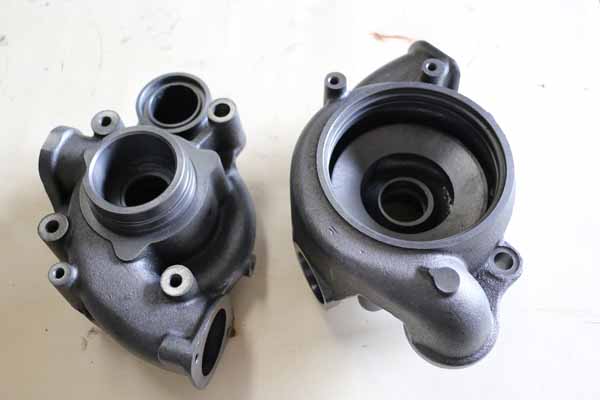Water pumps serve in a wide range of
applications such as pumping water
from wells, aquarium filtering, pond
filtering and aeration, in the car industry for water-cooling and fuel injection, in the energy industry for pumping oil and natural gas or for
operating cooling towers.
The water pump housings we supplied are
one of the key parts in the pump assembly.
We manufacture & sell more than 15,000
sets /year to all over the world.
We also supply fine machined Pump Accessories according to your requirement.
QFAP has specialize in producing pump
housings more than 5years.
Materials: Ductile iron, Grey
iron, Aluminum
Surface treatment: Painting,
Powder coating, only oiled
Main of our customers is from
German, USA, and CAN.
With the long terms of experience in the
pump industry, we could supply the pump housings or help to design the housings
according to your requirements.
Water Pump Housing,Water Pump Housing Leak,Water Pump Housing Gasket,Water Pump Housing Unit SHAOXING QIFENG AUTO PARTS CO., LTD. , https://www.sxqfap.com
Target Biofuels Clearly Replacing some petroleum-based gasoline or diesel with biofuels such as biodiesel, ethanol, and biobutanol has become the national policy of the United States. The goal of the United States is to use biofuels by 2025 to replace more than 75% of the oil imported from the Middle East.
The U.S. Department of Energy plans to use cellulosic ethanol as a low-cost alternative to gasoline by 2012. By 2030, biofuels will replace 30% of current gasoline consumption.
Biofuels now account for 4% of the US gasoline consumption, which means that in the 25 years the American bioethanol production must increase from the current 5 billion gallons to 60 billion gallons. To achieve this goal, chemical engineers must design more than 106 ethanol units in the United States.
According to the data from the American Renewable Fuels Association, 48 new ethanol plants and 8 existing plant expansion projects are under construction. However, most of the devices will not use cellulose raw materials, and if the ethanol production target is met, the United States will not have enough grains to meet the demand for food. Therefore, some ethanol production plants under construction will use new enzymes, microorganisms, catalysts and chemical additives.
New technologies emerge in endlessly New technologies for the production of biofuels from renewable chemical materials are accelerating their development. The process developed by DuPont and sugar producer Tate & Lyle can produce PTT polyester raw material 1,3-propanediol from cereal sugar. In 2002, DuPont collaborated with Diversa to develop an enzyme that breaks cellulose into sugars. It also collaborated with the US Renewable Energy Laboratory to develop Zymomonas mobilis, a fermented organic substance that can make glucose from starch and cellulose hard to obtain. Fermented xylose produces ethanol.
Another traditional oil company, Chevron, also established three biofuel research consortia in 2006. Recently, Chevron and NREL have cooperated to carry out research on converting biomass such as forestry and agricultural waste into ethanol and renewable fuels. .
In addition, to promote second-generation biofuels, Spain’s Abengoa has partnered with enzyme expert Dyadic International to develop an enzyme derived from the mold Chrysosporium lucknowense that can produce ethanol from biomass at low cost. According to this result, Abengoa has invested 10 million euros in the Dyadic stock market.
In addition, VeraSun, the second largest ethanol producer in the United States, has developed a process that can produce ethanol and biodiesel simultaneously from certain raw materials. The process can extract oil from the co-product of cereal ethanol production and then use the oil to make biodiesel. VeraSun plans to build 30 million gallons/year biodiesel plant in 2008. Lurgi will provide design and engineering for the new installation.
Technical services emerged As the development of biofuel technologies advanced, other companies were also accelerating biofuel assisted technology services. Honeywell’s UOP subsidiary and the Grace’s Davidson branch of refinery catalysts and system suppliers have been providing bio-fuel-specific catalysts and adsorbents to their bio-refinery customers in just one month. .
UOP's Renewable Energy and Chemicals Division and petroleum refiners have developed a series of bioprocesses. In early 2004, UOP began cooperation with NREL and the U.S. Northwest Asian National Laboratory to develop and process renewable raw material processes, such as the development of a catalyst for the conversion of glycerol to propylene glycol along with PNNL, which is expected to provide excess glycerin produced during biodiesel production. New way out.
Another UOP new technology is the conversion of vegetable oils and fats into a new type of diesel fuel that has higher energy density and higher cetane number than petroleum-based diesel or biodiesel. At the same time, UOP is also developing technologies for the production of high-quality olefins from suitable mixtures of vegetable oils and naphthas, and is studying the thermal and biochemical processes needed to commercialize biorefinery for the production of fuels and chemicals. Process. The company will work with enzyme specialists to develop biorefinery processes.
In response to the enormous enthusiasm of many oil refiners for biofuels, Grace’s Davidson branch also began supplying its customers with biofuel enzyme carriers, molecular sieves for fuel purification, and chromatography-based analysis. Quality control tools. Grace also is developing methods to convert the by-products of cereal ethanol production into chemical raw materials.
In view of the process fluids required for the production of biofuels, Solutia has developed a hydrocarbon-based Therminol heat transfer fluid specifically for use in biodiesel reactors and related reactor purifications, which combines biodiesel technology know-how with its heat transfer fluid knowledge. stand up.
In the era of gasoline $1 per gallon, biofuels were a small factor in the energy market. However, with the shortage of oil and soaring oil prices, biofuels produced from renewable resources such as grain and soybeans have caused great concern. At present, the production of biofuels and the development of related technologies are in full swing, and the global biofuel industry is gaining momentum.
March 30, 2021